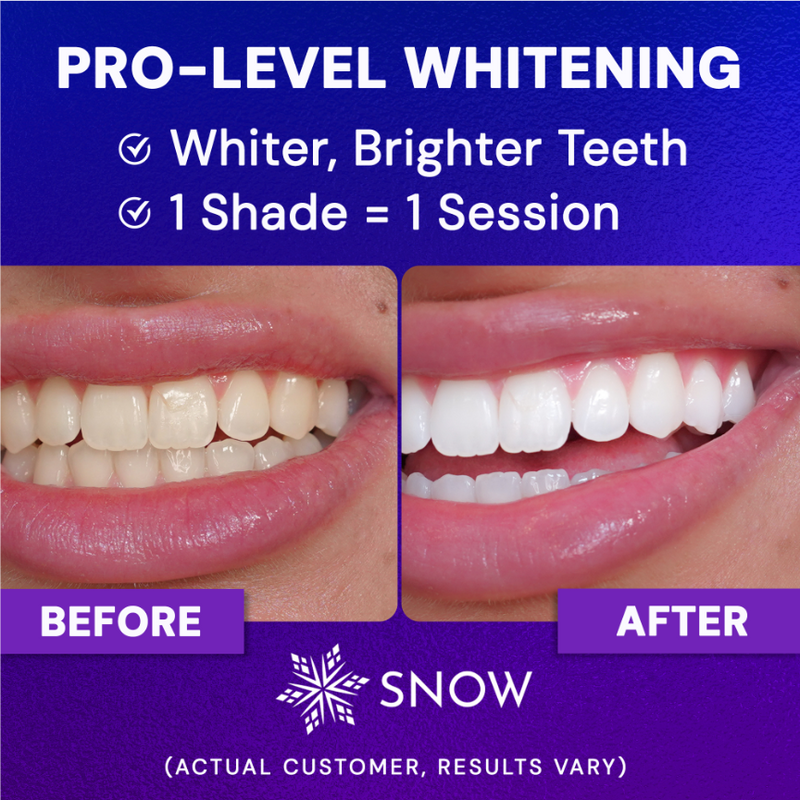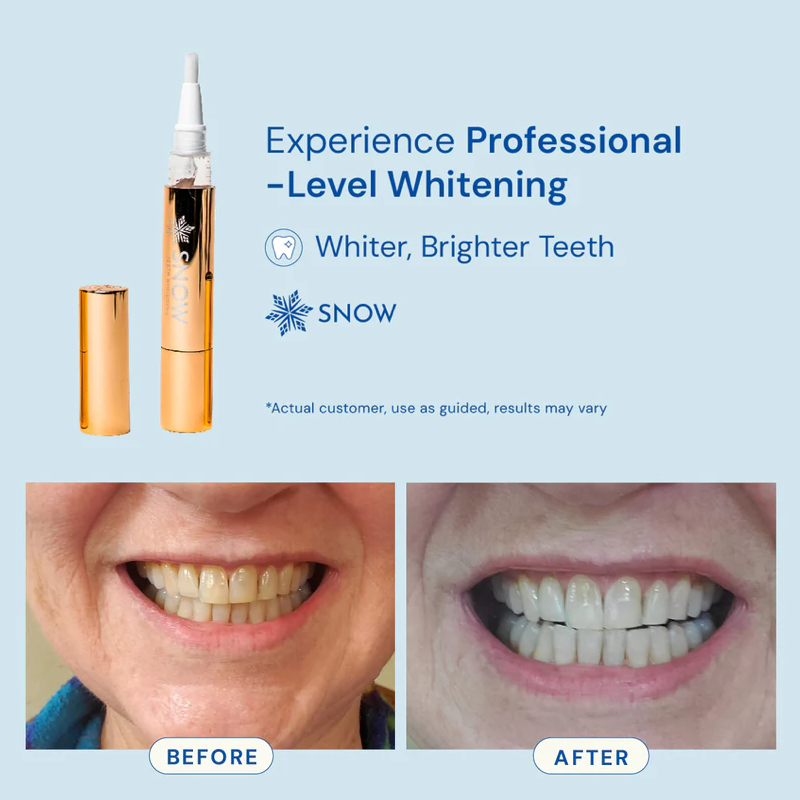If you are reading this, chances are you have used some sort of teeth whitening product and have experienced some form of tooth sensitivity.
Well, you came to the right place because we are about to dive into teeth whitening sensitivity and explain why whitening treatments can cause teeth sensitivity.
What is teeth whitening?
Nowadays, people are becoming more and more self-conscious about their smiles. If your teeth are yellow or you have some stains on your teeth, you may want to consider teeth whitening treatments.
Your smile can affect your self confidence and having stained teeth plays a huge role in that.
So you have decided to consider teeth whitening. But how does it actually work?
How does it work?
All whitening products use some form of a whitening agent to help dissolve surface stains from your teeth. Yes, I said surface stains because whitening products only work on extrinsic stains (on the outside of your teeth) not intrinsic stains (inside your teeth).
Also, they do not work on porcelain veneers, crowns, or tooth-colored fillings, only on your natural teeth.
You place the whitening agent on the teeth and allow it to do its work. Whitening agents are typically made up of many ingredients, but the typical active ingredients that actually do the whitening are carbamide peroxide and hydrogen peroxide.
Whitening Strips
This is exactly what it sounds like. This is a strip of plastic that has the whitening serum embedded in it. You take the strip and apply it to your teeth and allow the whitening treatment to take place. Once the treatment time to complete, remove the strip and rinse with water. Some whitening strips are also self-dissolving, so all you need to do is rinse.
Whitening Tray
This can be a custom tray made specifically for your mouth, or a generic one size fits all tray.
All you do is place the whitening serum in the tray and then place it over your teeth. Some whitening systems use an activating light to accelerate the whitening process.
This type of light-activated bleaching agent has a special ingredient that causes the active ingredient to work faster. So rather than waiting 45 minutes to an hour for the whitening process to take place, you only need to wait 10 minutes.
Professional Teeth Whitening
This procedure is done in the office using a high concentration bleaching gel to whiten your teeth. Your saliva is controlled with suction, and your gums are protected to prevent any harm. This type of whitening procedure is done at a dentist's office to give you pearly whites.
What causes tooth sensitivity?
The outer layer of your teeth is called enamel, and the inner layer is called dentin. Enamel is the hardest substance in the body. However, it is also porous. There are small dental tubules embedded in the enamel that is connected with the pulp (nerve) of the tooth.
Whitening procedures or whitening toothpaste, affect the enamel layer of your teeth. As you use these teeth whitening products, you can cause harm to your tooth enamel, cause gum sensitivity, create dentin hypersensitivity, and cause permanent damage.
This is why it is important to understand how whitening strips and other whitening products work. Reading user instructions is important to ensure you safely get the white smile you always hoped for.
Reduce Sensitivity
To help reduce sensitivity, you want to first make sure you have good oral hygiene. Visit the dental office for a routine dental appointment, as recommended by the American Dental Association (ADA).
You want to ensure you are using a soft-bristled toothbrush, and rinsing your mouth with water after eating/drinking staining foods (such as wine, curry, turmeric, pomegranate, coffee, etc). This also applies if you are a smoker.
Your dentist will ensure your teeth, dentin layer, and enamel are healthy on your natural teeth (no decay). They will also make sure you do not have gum disease, and if you do, they want to treat that before you even begin to think about any whitening procedure.
When using whitening products make sure to read the instructions as it can affect your whitening results. In the user manual, you can find information on what to do if you experience sensitive teeth after using the product, if you experience discomfort while using the product, or if you are not seeing any treatment results.
Signs of sensitive teeth
On your journey to a whiter smile, there are some signs to look for when using whitening products.
If your teeth are sensitive to extreme temperatures (hot and cold) such as hot food or drinks, stop using the product and contact your dentist. Avoid extremely hot food and drinks to help create less teeth sensitivity.
When using whitening strips, make sure the strip stays on your teeth, and you control your saliva.
Naturally, when you put whitening strips on your teeth, your mouth will think you have food in there and will start to produce saliva. Not only does saliva dilute the serum and reduce its effectiveness, but it also causes the serum to move around to areas other than your teeth.
If the serum gets on your gums while using whitening strips or other whitening products, it can burn your gums.
This can make your teeth even more sensitive. Your dentist can minimize this from happening when you get a professional teeth whitening procedure done in the office.
Summary
To get a beautiful smile, your journey should always start at the dental office.
Your dentist can manage teeth sensitivity, prevent damage to your teeth, provide teeth whitening options best for your oral health or provide professional whitening in house.
Teeth whitening strips are extremely convenient and easy to use but they can cause teeth sensitivity. Talk to your dentist before considering whitening teeth. A brighter smile can be achieved safely, with the help of your dentist.
- Dr. James Younan, DDS
(AKA Dr. Gibbz, Public Health Dentist)
Disclaimer: This article is for educational purposes only and there is no doctor/patient relationship being established by reading this article. Always consult with your dentist or primary care provider. This article is not intended to offer medical or dental advice to anyone, it is not intended to diagnose any medical or dental conditions that you may have. There are no warranties and/or guarantees being made with the information being presented in this article.






































































